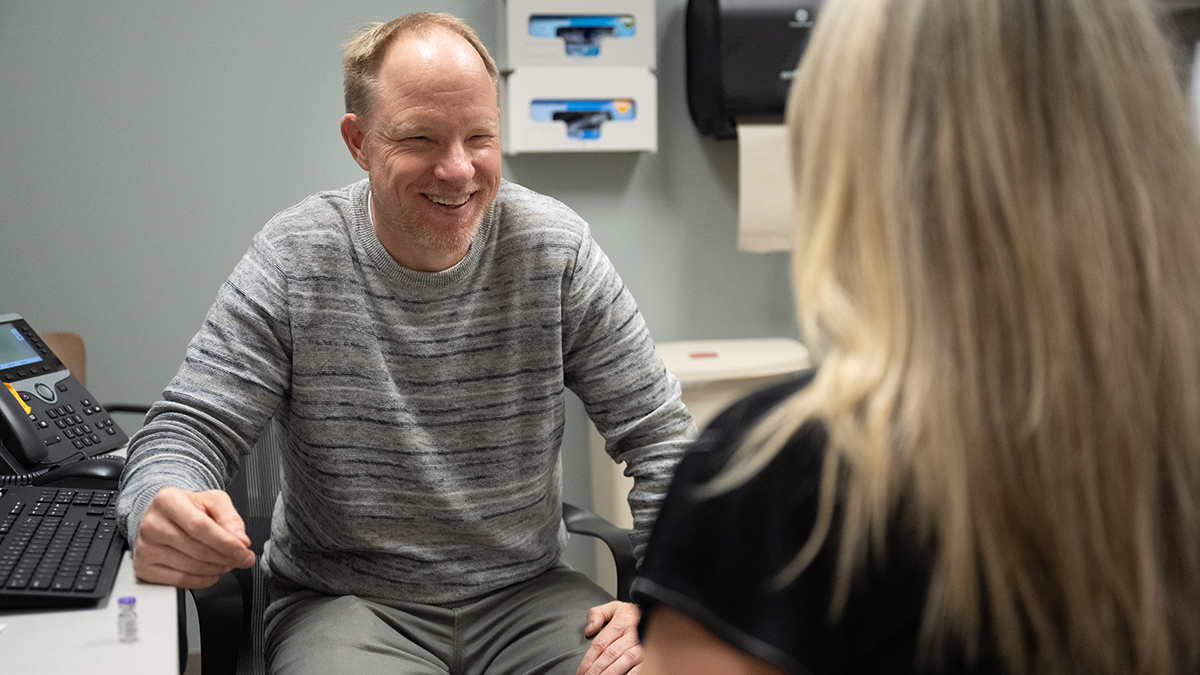
With help from alumni, a new course is teaching UW–Madison School of Pharmacy PharmD students the complex ecosystem of managed care
By Archer Parquette
When Dave Mott (BS ’88, MS ’92, PhD ’95) helped lead the 2024 National Pharmacist Workforce Survey, the University of Wisconsin–Madison School of Pharmacy professor discovered something interesting: managed care pharmacists report both high job satisfaction and above-average wages compared with the profession overall.
Yet despite the field’s growth — fueled by rising drug costs, the surge of specialty medications, and the shift toward value-based care — many future pharmacists are unfamiliar with what managed care entails. To close that gap, Mott has teamed up with School of Pharmacy alumni to launch a new course, piloted last year and returning this fall.

“We were seeing students who wanted to get into managed care who wanted more coursework around this topic,” says Mott. “I don’t have the expertise that our alumni have on the day-to-day ins-and-outs of managed care, so I talked to a lot of our alumni working in the field about the idea of a course.”
One of those conversations was with Patrick Cory (BS ’92, PharmD ’95), a longtime managed care pharmacy leader and current pharmacy benefits consultant who had been a guest lecturer in another of Mott’s previous classes. Cory was excited by the idea of a course focusing entirely on managed care and knew that with nearly 30 years of experience in the field, he had a lot to contribute.
He and Mott designed and taught the pilot together, with the input of other alumni working in the field: Nick Friedlander (PharmD ’20), Nancy Gilbride (BS ’90, MS ’93), and Susie Moroney (PharmD ’01).
“There are more and more students interested in learning about managed care,” Cory says. “Even if students don’t go into managed care as a career, the field impacts what they will do as a career, so to understand that ecosystem is valuable.”
Working with alumni experts
Managed care pharmacists have many roles: working with insurance companies to determine which medicines are covered for patients, creating cost-effective medication plans with pharmacy benefit management companies, managing medications for government programs like Medicare, and more. Last year’s pilot course introduced students to the fundamentals of that field — the role of pharmacy benefit managers and how they interact with manufacturers, employers and the government; the structure of prescription drug benefits; how prior authorization works; and more.

“Every class session is structured like a discussion,” Cory says. “We present material, but it is very much a conversation. The students are welcome to interrupt us, to question us. It is a great learning environment, and I am very happy with how engaged the students were.”
While Mott and Cory teach every class, they enlist the help of other alumni to guest lecture and work with students.
Friedlander, clinical programs pharmacist at Prime Therapeutics, spoke about his experience building a career in the field. Gilbride, principal and chief commercial officer at RxClarityGroup, spoke about consulting in managed care. And Moroney, a director at Novartis, explained how pharmaceutical companies interact with managed care pharmacists.
“I think the course combines higher-level academic knowledge with the in-the-weeds, in-depth information that our alumni working in this field bring,” Mott says. “We’re meeting a need for our students, and then they can take this knowledge and information and turn it into a career opportunity.”
Preparing pharmacists for the future
Last year’s pilot course was broken into three units. The first was a high-level look at the pharmaceutical drug channel of distribution; the second dove deep into what pharmacists in managed care do day-to-day; and the third was a bit more novel. Mott and Cory “flipped the classroom,” and broke students into groups to research current issues in managed care. They then presented the information to their classmates.

“As faculty, it was great to see,” Mott says. “These students were taking the fundamentals we’d taught them in the first two units and applying them. We could tell from how they were talking about it and how they presented that they understood the concepts and were connecting the dots.”
After the pilot course’s end, Mott and Cory surveyed the students and used the feedback to tailor this year’s course.
“We’re expanding certain topics and shrinking others and figuring out new ways to present,” Cory says. “If our students don’t understand why things happen in managed care, they have a very limited ability to have an impact on them in their career. Managed care will affect their careers no matter what area of pharmacy they go into. Our goal is to pull aside the curtain and show them what goes on and why.”
Mott is welcoming back the same lineup of alumni speakers for this year’s course, citing the overwhelmingly positive response from students.
“Managed care will affect their careers no matter what area of pharmacy they go into. Our goal is to pull aside the curtain and show them what goes on and why.”
–Patrick Cory
“I really appreciate our alumni giving their time and talents,” Mott says. “Our students have told me how much they enjoy interacting with our alumni. They recognize the expertise and value they bring into the classroom.”
The new managed care course is part of a triad of recently revamped courses — alongside courses in specialty pharmacy and health systems — designed to improve PharmD students’ financial literacy, digital literacy, and data literacy.
“You have to understand finances and the flow of money, you have to understand the type of data that’s available and how data are used, and you need to understand how data is collected and transferred digitally,” Mott says. “These are fundamental to being a high-functioning pharmacist in these spaces.”

